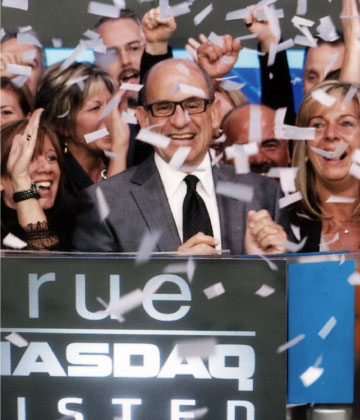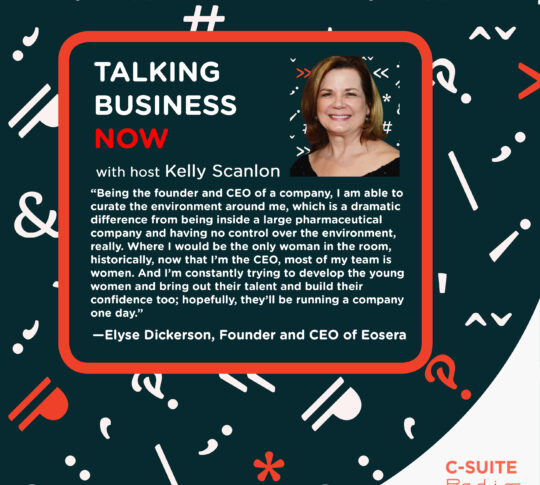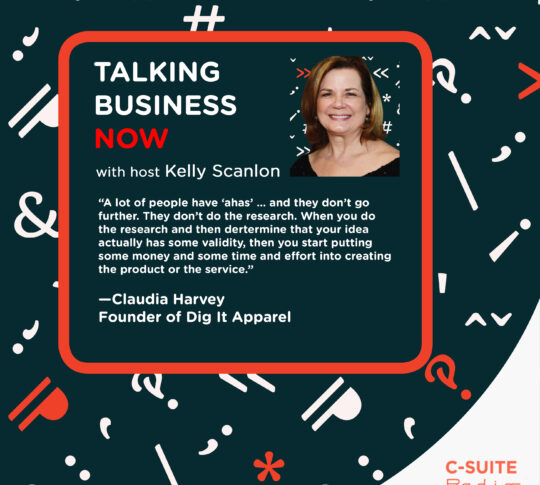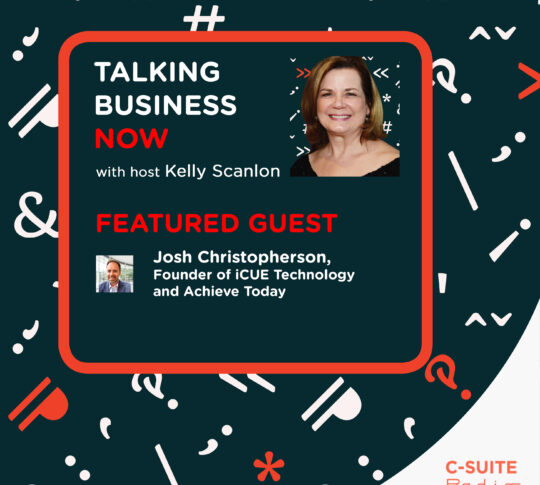
Listen to the podcast episode here, or read the transcript below for Mentoring Across Generations to Transform Business.
Kelly Scanlon: Welcome to Talking Business Now. I’m your host, Kelly Scanlon. Thank you for joining us.
We’re Talking Business Now with Bob Fisch, the author of Fisch Tales: The Making of a Millennial Baby Boomer. He’s recognized as a pioneer in value-priced, fast fashion retailing. Bob Rose to the rank of president at Casual Corner and he’s the former CEO of rue21, a retailer of women’s casual apparel and accessories. As CEO of rue21, Bob took it from bankruptcy to a fast-track winning streak that included a hot stock IPO, building a national network of 1,200 stores and a billion dollar plus valuation. Bob earned the reputation as a disruptor in the retail industry, and he’s at it again as he works to expand what he calls the Millennial Baby Boomer brand and mindset. In this episode of Talking Business Now, Bob talks with us about his new book and what baby boomers still don’t understand about their millennial co-workers. Welcome, Bob.
Bob Fisch: Hey, welcome, Kelly. It’s great to be on your show.
Kelly Scanlon: I am dying to know, what is a millennial baby boomer?
Bob Fisch: Everybody always likes to ask that, and I’ll be happy to tell you. First off, millennial baby boomer, I have now the registration and intellectual property for millennial baby boomer, and so no one else can use it. I own it, and I’m certainly going to enjoy using it.
Kelly Scanlon: Yeah, it’s a great brand.
Bob Fisch: Yes. So to me, I was really looking forward to getting that a couple of months ago. And really, I’m really technically the first of many. Because it’s not like I’m the only one that really is there because it’s really a blending of the millennial and baby boomer thought pattern mentality and lifestyle—and it’s not what you are, it’s who you are as a person. And so, to me, it’s really something that I’ve always been able to weather early in my career and life—relate to people older than me. Just remember, we were all 25 years old once.
Kelly Scanlon: Oh, yes, a long time ago.
Bob Fisch: So, but the point is, is that, you know, so, so to me, baby boomers were 23-25. And you keep that title, you know, even if you get older. And the same thing is going to happen with millennials and Generation Z. To me, though, it’s really the blending of different generations and some of their characteristics. And I really relate well to people that are younger than me by a lot, and people my own age. So to me, I looked at it and felt that when we talk about, you know, going further talking about bridging the gap and mutual mentoring, it was all like millennial baby boomer is really I can be relating to both.
Kelly Scanlon: What you’re basically saying is that a lot of times we apply labels to things and they really get in the way. You know, in this instance, you’re not defining millennials or baby boomers by their age. It’s really more about the mindset. So talk about how when you put those labels—the baby boomer and the millennial labels—on people, how do they get in the way of how people view each other and how they interact in the workplace?
Bob Fisch: Right now, there’s a big cliche thing happening out there, Kelly, about “Okay, boomers”
Kelly Scanlon: Oh yeah
Bob Fisch: And there’s t shirts of it. Okay, boomer, have a terrible day. I actually did a blog a month ago with Forbes and I did not just “Okay, boomer,” I did “Okay, millennial—and then have a terrible day t shirt. And neither of that is what I want—having a terrible day. It’s try not to, as you’re saying, stereotype what people are. But everybody has characteristics. I mean, you know, to me that, you know, relate to different generations. And it’s really the blending of it. And so, to me, what I look at is, you know, Millennials are people that I see are very creative, and have some great new vision. And they don’t always know how to take the vision to fruition and make it happen. And that’s where the baby boomer comes in. And so, you know, there’s a stereotype where millennials are thinking like the baby boomers are getting in the way of their jobs and they can’t get ahead. Honestly, that was never how I looked at people is whether you were 25, or whether you were 45—who’s doing the best job and who really understands the company and understands where we’re at?
But it’s getting people to understand that and so that’s what I see and as a millennial, you know, it’s now the baby boomer gets worried saying, “The millennial’s going to take care my job.” And I said, “No, I think you have to be open to changing things up and getting out of your comfort zone.”
I formed a millennial advisory board, Kelly. And you know, not only for the book. Originally it started out to help me put the book together. But it’s also building my brand, millennial baby boomer, and going after that. And so I have a group of people that are millennials and generation Xers and baby boomers together, and it’s great. Some of these young people get me out of my comfort zone and help me reinvent and recreate yourself. You know, so to me, it’s how you get millennials—which we’ll talk about—to do things. But it’s also baby boomers. And to me, look, I see something happening out there. And there’s a real wave right now going on of this because, you know, when I started, I made my decision to go with Forbes with Steve Forbes and Adam Witty, who is the president of ForbesBooks. They saw a big whitespace opportunity of millennials and baby boomers working together. And he didn’t realize the thinking that the baby boomers just, you know, mentor millennials, but the millennials can teach baby boomers things. And that’s what I find every day. And I find that it’s great to have people getting me out of my comfort zone and reinventing myself.
And one other further thing is that the people of today who are 25 or 30, Kelly, are gonna live to 100.
Kelly Scanlon: Oh, yes.
Bob Fisch: And the people, people who are just born are going to be spry 80s working and they’re going to live to 110. That means you’re going to be working 80 years of your life potentially, you know? Maybe I’m not going to be, but other people are. And so you might have a couple of professions, and people kept saying to me when I left rue21 after building it into the largest specialty store retailer and store count in America, “Yeah, well, I guess you’re retired.” No, I was looking to do other things. I always want to be around people. And I thought mentoring people would be great, and building relationships would be great. But people are going to be living a long time. So, they need to understand this and learn how to work together.
Kelly Scanlon: You actually took the next question I had right out of my mouth, which was you were the successful retailer rue21. You totally reinvented after taking it over, really recreated it to where you were pretty much the founder of the reincarnation of the store. You could have written your ticket after you exited. Why did you—really besides the reasons that you just said—go a little deeper with that? Why did you decide that this was where you were going to make your next mark? Why this, when you there’s so many things you could have done?
Bob Fisch: Well, actually that’s a great question, and very good thinking question. And your absolutely right. Look, I took this business and it was crazy. And I took it into bankruptcy right after I first got there, and then never missed an estimate as a high-growth company for 11 straight years of 45 quarters. We took it back to private, then we took it public. And then I sold it back to the equity guys for over a billion dollars. And I was going to go public again, but if it ended up crazy, whatever.
If I was still at Rue and writing this book and building my future, it would have been a memoir, it would have been all about me and Rue. And that’s not what it’s about. I realized that what I really enjoy in life, Kelly, is giving back where—from not just theory—a lot of people write books about theory and how you should do things. And mine wasn’t theory. It’s all actual practice of things that I built, something that most people never did. And nobody really cares all the time about, oh gee, what you did in the past. It’s how you take the past to the future. So, if I was going to keep my legacy, it was then to building something and saying I’m a published author, but I wanted to give back and to help people be better than they ever thought they could be in business or life in taking a stand and take risks and making something of themselves. And that’s what I really enjoy.
Kelly Scanlon: So we have this gap that you talked about between the generations. And one of the things that you believe helps bridge that generation gap is mutual mentoring. You’ve been referring to it a bit in our conversation so far. Let’s drill down on it. How does mutual mentoring work? And why is it important?
Bob Fisch: I believe so much that I don’t think it’s just being from the past of something. It’s just, you know, I started out at Abraham & Straus, which is a Federated company now. That was like being on the Boston Celtics of the Lakers and then having great coaches and you became a great coach and, you know, great training and everything like that.
But I believe that people and mutual mentoring is that it’s all about leadership, first of all. I don’t know if it’s corny, whatever, that I built a corporation, big billion dollar corporation, where really it was all about building a family, a business. It’s not like that today all the time. But it’s how you have to put your energy into it. I had 20,000 people working for me, and 90% of them were under 35. I have 400 in the office and 300 were between 20 and 30 years old. And somehow we built this huge business. So it’s working together and that to me, I felt that’s what I should really be working on. And mutual mentoring is really is that I have so many good mentors in my life, but you make those mentors. It’s not lucky.You find them. And I find that I love having young people who push to mentor me and push to mentor other people. I think you have to foster those relationships and you start it as the baby boomer to get them to really trust you and understand you. Because trust and understanding to me is still something that’s important, not just data. It’s about people.
Kelly Scanlon: What do you teach each other?
Bob Fisch: Well, as I write in the subtitle of my book, I teach them business, and they teach me life. And so you work together on it.
So, for example, they have a lot of great creativity. They understand technology better than I do, Oh, my God. Now I’m all of a sudden in the middle of spending all the time on social media, and really learning how to utilize that properly, because I’m not 27 years old. But you have to do that. And so they bring a great knowledge that you bridge the gap.
And so, look, I was working with somebody who ran a company JetSmarter, Sergey Petrossov. And he is somebody who’s 30 years old and is building this big business, but it’s how to take a vision to be the Airbnb of the skies, which he was trying to build to fruition. And you need the help of people that have had that experience. So I think that’s the blending.
And so instead of it being people knocking each other, it’s one other thing. I believe so much in mentoring, this reverse mentoring, and that’s what Adam Witty was saying to me is that is that the young people mentoring the baby boomers or Generation X in business and in life. Two things. One, I did that at Rue, you know, where I would form groups of people, that young people coming up with new ideas that we should have in place or new categories of business, or just thinking differently. And they didn’t always know how to strategize it to the nth degree, and financially understand it, but that’s where somebody with experience helps and you work together on it. Does that make sense?
Kelly Scanlon: Yeah, it does. And I love the term, the way you refer to that as generation splicing, where basically you are bridging that divide and putting the best really of both generations together.
Bob Fisch: Yeah, I look at things in life is the best is yet to come for people. There’s too many people of the 25 to 30, whether it’s in your family or people around you at work that feel like, “Gee, I’m not successful yet to where I should be.” And you know, when we grew up, it was like you took one step at a time and you were driven but it wasn’t like, gee, if we weren’t Mark Zuckerberg at 25 or 30 years old, making millions of dollars, the best is yet to come. It doesn’t always happen then, and I try to teach young people that they can have a family, they can have business, and really develop. But don’t try to cover all bases at once. The pieces of the puzzle take time to put together, so you know, so that’s the whole thing about generation splicing and tying it together. It’s you know, it doesn’t matter as you said earlier, it’s a lifestyle approach of who we are. But, we really need to work with people and realize—and they need to realize—”Calm down. You can be successful.”
The best years that I had were probably in my 50s to early 60s. And if I would have just get scared at 30, you know—people 30 go, “what’s going to happen with me”? They’re going to have to be around a long time. So you have to help teach them. But I think you have to, just like with kids, they don’t always want to listen to you. But you have to make them see that you kind of are smart about something and you do care about them. Because young people are selfish. We were selfish. So I can’t be thinking about me like, “well, they should be thinking about me because I’ve achieved all this.” No, I got to think about them and say, “How do I get through to them so they really understand so I can help them?”
Kelly Scanlon: Yeah, let’s put some practical applications around it. I mean, I love everything that you’re saying. But let’s say, you know, let’s put it in the work environment. I am a CEO or a top-level manager and I’ve got a multi-generational workforce that’s bookended by, on the one side, millennials, on the other side, you know, baby boomers and, you know, there’s another generation that’s quickly coming up, even behind the millennials, but I’m here and maybe I do have some dissension in my company and those two generations, in particular, those two generations aren’t getting along. What is your advice for putting into action, everything that you’ve just said?
Bob Fisch: I think the way I’ve lived my life and pass that down to people, because again it is not theory, is not to be afraid to take a stand and take action and speak up. I find a lot of young people are afraid to do that, to really speak up and put things on the line. I’m not telling you they should all put their jobs on the line. Sometimes I did. But they need to speak up. And they need to be clear that when they do have a proper message, okay, that they are not just thinking just because the way they want to do things, but they’re thinking about how it’s going to affect their customer, the environment, and how does it affect the person who they’re speaking to?
And that’s where I talk about weaponizing listening, because if you have to listen, and that’s any age—I don’t believe it’s just the millennials don’t listen—I believe any age bracket doesn’t. But to me, it’s leadership, mentorship, and weaponizing listening, and I think it’s getting people to understand that if they want to put it on the line at some point. But because people say, I come to work every day, do my job. What are you doing that makes a difference? You know, I gotta tell you, Kelly, it’s the world today in business that not everybody realizes you’re supposed to make a profit. So, people today are like, ”Well, I’m going to build something of value in the company. Profit? I don’t know if you’re gonna make a profit.”
Well, right now with credit terms being low where people can get interest rates low, that’s okay. But it’s going to change a lot. It’s already changed. You look what happened to WeWork, and companies like that. People have to make money. So, they’re gonna have to realize that. And so I don’t want to tell them that I have an attitude and have all the answers to life and you need to learn from me, because everybody’s gotta learn themselves. But you have to help them a little to learn for themselves just like you would do with your family. So I’m very passionate about that. And nothing is more important to me now in my life than to give back where I can have people really doing well, who really want it. Somebody who doesn’t want it, I can’t push them. But somebody who wants it? So that’s what I feel about that. And so to me, that’s working that together and you have to practice what you preach. And you really, you know ,what I did, well, I put it on the line. And you can’t worry about fear. You’re going to make mistakes. And I think people, I like to push people and throw them into the water to see how they swim. But then you got to be there for them to give them the lifeline. Too many people say, “Oh, you didn’t swim. So you’re gone.” Now, I don’t believe that. I believe you have to build people. And so that would make me a little different, and that’s what I really enjoy doing.
Kelly Scanlon: You work with a lot of youth. You work with baby boomers too. What are some of the specific things when you think about the travel that you do and your interactions with younger people—what are some of the things that you most appreciate? I know you’ve talked about creativity and, you know, they’re more familiar with technology. But is there anything else, something that a little deeper maybe that you gained from them?
Bob Fisch: Well, I gained from them that they really make a difference, and I try to have them feel that they can really influence me. There’s a gentleman that runs a big, big company called Estee Lauder. This guy named Fabrizio Freda. And he took a business in 2009 that was huge at $7 billion and worth 7 billion. You won’t believe it today. It’s a $14 billion company in sales, but $75 billion in value. It’s unbelievable. But what he did five years ago was very interesting. You’d think working with the Lauder family and everything, it’s stuffy, whatever. He started building with millennials coming up with new ideas and new companies to buy, new businesses to look at, new products, and now has 475 millennials working with 300 senior executives in 22 countries. And it’s called reverse mentoring.
And so I look at things like that, and that’s kind of how I looked at building Rue on a smaller basis than him. Like, if he could do that, then other people could do that. And it’s really being able to give back. We’ve had somebody recently that’s just obviously passed away, along with other people, and that’s Kobe Bryant. And nothing is more passionate no matter where you live, whether you’re in Kansas, Missouri, whether you’re in New York, whether you’re in California, you know, wherever. And the thing that’s great was not him as a player. It’s him as a person, a human being and a father, and how he really wanted to see people develop and push them further. And I believe that’s what I feel about. And I owe that to listening to somebody like him, and realizing he was a greater man than I ever realized, and that that’s what life’s about. And the best is yet to come in life, whether it’s for a millennial, a generation X or a baby boomer, if you want to let it be that way.
Kelly Scanlon: What a great note to end the show on, Bob. I mean, you can’t get any better than that. The best is yet to come. Your book, Fisch Tales: The Making of a Millennial Baby Boomer, where can we get a copy?
Bob Fisch: Sure, first of all, my website is millennialbabyboomer.com. And it’s got a lot of good stuff in there, including blogs and podcasts and media action. And we’ve got the books on Amazon and Barnes & Noble and Target and other fine stores. And I’m really very interactive on FischTales1 on my Instagram, which is F-I-S-C-H-T-A-L-E-S-1. And you know, just different interactions and social media. And so, to me, that’s where you can get it, and I look to make a difference. And I think that the School of Fisch Lessons in the book and the chapters have great things that aren’t just theory. They’re action that you could take. I really want to give back and see people do better than they ever could be and the best is yet to come.
Kelly Scanlon: Thank you so much for joining us today, sharing this mission and for engaging all of us in it and inviting us into it as well. It’s been a pleasure.
Bob Fisch: Thank you, Kelly. I really enjoyed being on your show. Thank you so much.
Kelly Scanlon: And I’m your host Kelly Scanlon. Thanks for joining us today.



